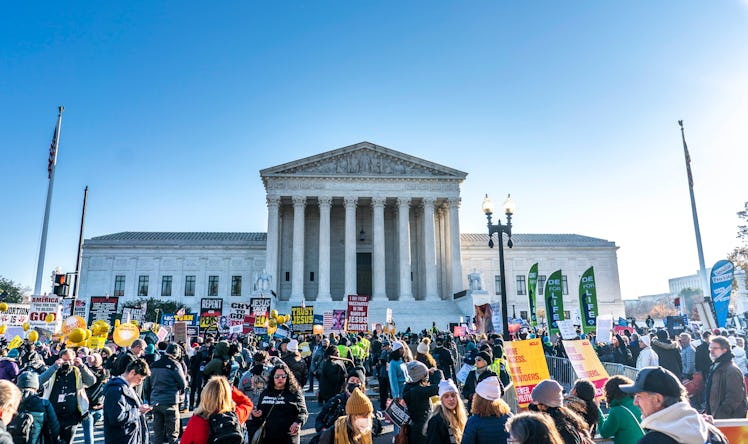
Here's When The Supreme Court Could Potentially Strike Roe V. Wade Down
Other civil rights could also be in danger.
The future of reproductive rights in the United States is looking pretty bleak. On May 2, the Supreme Court’s initial draft decision on Dobbs v. Jackson Women's Health Organization (a pivotal abortion rights case) was leaked and published through Politico, and its contents signal an ominous future for the landmark 1973 decision in Roe v. Wade. While the draft was confirmed as authentic by Chief Justice John Roberts, it still isn’t final, and people all over the nation are wondering: When will the Supreme Court rule on abortion rights? Here's when an official decision could come.
Authored by Bush-appointed Justice Samuel Alito, the 98-page draft opinion rips into Roe’s logic and legal protections — the same protections that, many experts note, protect the rights to birth control access, LGBTQ+ rights, and gay marriage. “Roe was egregiously wrong from the start. Its reasoning was exceptionally weak, and the decision has had damaging consequences,” Alito wrote. “We hold that Roe and Casey must be overruled,” he added. “It is time to heed the Constitution and return the issue of abortion to the people’s elected representatives.” While the draft decisively strikes Roe down in a five to four majority opinion, a formal ruling on Dobbs v. Jackson isn’t expected until late June or early July.
Justices Clarence Thomas, Neil Gorsuch, Brett Kavanaugh, and Amy Coney Barrett all voted alongside Alito to strike down Roe, while Justices Stephen Breyer, Sonia Sotomayor, and Elena Kagan are working on dissents, per Politico’s anonymous source. As it is written, this initial draft of the Supreme Court’s majority opinion would put an immediate end to the federally protected guarantee to a person’s right to have an abortion — leaving it up to individual states to decide whether or not abortion should remain legal.
This is why, President Joe Biden stated in a May 3 press release, it’s so important for voters to participate in the November midterm elections: If the court does indeed overturn Roe, the bulk of the duty to protect reproductive rights will fall on elected officials on the state level, as well as in the House and the Senate. And the responsibility to elect pro-choice officials “will fall on voters,” according to Biden. However, with the systemic gutting of the Voting Rights Act of 1965, along with several other factors that impede voting access, people across the country are questioning whether voting is enough to balance the dramatic rightward shift in the nation’s political landscape.
Indeed, even before an official SCOTUS opinion has been released, dozens of state legislatures have already planned to criminalize abortion in the absence of Roe. As of May 3, 28 states across the country have prepared to implement laws that would ban abortion outright, while 13 of those states have “trigger” laws on the books that would outlaw abortion as soon as Roe is struck down.
“This leaked draft, if it becomes final, shows that the Supreme Court will outright turn its back on the fundamental right to abortion in this country and will dismantle our ability to make decisions about our health and families,” says Morgan Hopkins, Interim Executive Director of Campaigns and Strategies for All* Above All, in a May 2 statement to Elite Daily. “The implications of this potential outcome would be earth shattering and felt hardest by communities of color and people working to make ends meet. We need abortion justice now, more than ever.”
For reproductive rights activists across the country, witnessing the possibility of Roe being overturned is painful enough in itself — but its even more difficult to prepare for its outright fall, as millions of pregnancy-capable people would effectively see abortion become out of reach in large swaths of the country. To be clear, abortion is still a federally protected right as of May 3. However, that may change as soon as the Supreme Court issues their official decision in late June or early July. Until then, abortion care proponents and providers are working around the clock to ensure people have access to the health care they need.